Sacred Chickens
Menu
SACRED CHICKENS
|
Catechism With the circus trade done for, clowns are few and far. Sport and film stars, models and politicos fill in the gap. When connections take to unconnected tracks they drum what we wish not to catch the drift of, closely bird-dogging for collaborators. Moot point: what is evil, Suggestio Falsi or Suppressio Veri? Sequitur Epilogues are fortuitous settings. In them is cached anthology of missed beats, of those that could have been performed differently. In outrecuidance of vacuums, need is to nurture the self. If you reach yourself, you will reach others. Positions (1) Took on grief that wasn’t mine so you could mollycoddle me. By the time this reached you, the dandling didn’t matter. (2) Ambivalence of apodictic hooks makes sense of truths we spurn. Antinomes possess incertitudes. In-betweenness is blight and boon. Euphoria It is a condition. What others see as loneliness, is natural to some. In its recesses sundry worthwhile connections come alive. These fuel inner channels to fruition. Resultant bliss is the reward. Machinations Comstockery is ammunition in the repository of regimes who wish to postpone unfamiliar ideas from entering portals of understanding. Uninformed balloters are escalators to victory. Mass media blitz ensures total eclipse isn’t feasible: cataract of blurred realities feed us. In this map of mindlessness the vulgus are their own cartographers. 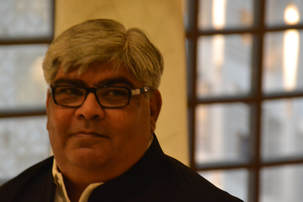 Sanjeev Sethi is the author of three books of poetry. His most recent collection is This Summer and That Summer (Bloomsbury, 2015). His poems are in venues around the world: Ann Arbor Review, Mad Swirl, Empty Mirror, Antarctica Journal, Scarlet Leaf Review, First Literary Review-East, Right Hand Pointing, The Paragon Journal, Grey Sparrow Journal, The Synesthesia Anthology: 2013-2017, London Grip, Be Untexed, and elsewhere. He lives in Mumbai, India.
0 Comments
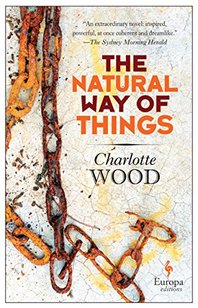 There are so many wonderful things that I would like to say about this book, and so many important messages, that it’s hard to know where to start. Let me then begin with a question: What defines you? What is the essence that marks you as a person? Are these markers internal or external, perhaps a little of both? Many of my personal markers are external: dark eyes and nails, colorful clothing, et cetera. These are commonly referred to as, “gender markers,” or things that we decorate ourselves with to characterize us as male or female, or to perhaps flagrantly violate these expectations. This idea of the external factors that make us male or female is integral to the novel, where the author explores the way in which rape culture treats the victims, and the relationship that humankind has with the natural world. The novel itself has so many fascinating and important messages, but the plot itself is also superbly done. I read this book in three days, and for those three days I was engulfed within the novel; I couldn’t put it down. It centers around a group of women, all who have been involved in high profile sex scandals, who are kidnapped and sent to a work camp. Their hair is shaved and they are made to labor over the construction of a road, not with modern tools and amenities, but with their bare hands. Their wardens are two awful men, Boncer and Teddy, who continually harass and demean them, both verbally and physically. They are made to sleep in kennels, and, even though the book hints that this takes place in the modern world, there are no modern luxuries to be found here. Without giving too much away, I’ll only say that these women are debased in a way that would be abhorrent to even the staunchest misogynist, although I doubt that they would see the parallels. It is, at times, difficult to read, but well worth it. This concept of the camp and the degradation of the women is a commentary on the way in which women are, “slut-shamed,” rape victims are accused of bringing the violence on themselves, celebrities are threatened and harassed online, and in extreme cases, women are murdered in the name of honor. This horrific behavior is a stark reminder that female sexuality, and the extreme measures to, “control,” it, remain volatile in nearly every culture. Although the book makes some extremely important and sadly relevant points, there is a point where it could seem slightly dogmatic; however, through Wood’s vivid descriptive voice, it is most certainly not. Detail is important here; the reader is given vivid descriptions of nearly everything around the captives, but it’s not written in such a way that the reader perceives that this is what the character is experiencing, rather that the reader experiences every emotion and blow and atrocity along with the characters. There are two characters who clue the reader into the books title. Yolanda and Verla, two of the women most changed by the experience, challenge their captor’s dominion over them. Boncer and Teddy believe that it’s natural for men to lord over women; however, these two recreate themselves in their confinement, developing a new way of living and thinking that is more deeply in tune with the natural order, and through this transformation they dispel the historical image of women’s subservience. One of the most the fascinating sub-plots in the book is Yolanda’s story and transformation. It’s truly interesting to see her progression and how she distances herself from her former self. The book also examines internalized sexism, and how detrimental that can be in the struggle for equality. Throughout the novel, the girls repeatedly use the derogatory language that is often employed by their captors. Even though they are all in the same situation together, for much of the book they are at odds with each other. Instead of standing in solidarity, they separate into cliques and constantly berate each other. Overall, this is one of the best books that I’ve read this year, perhaps the best. I adore it, especially since it’s so relevant, and because the plot is amazing. It’s a reminder that, even though the Feminist and Equality movements have pushed us forward, there is still so much to do. Political engagement is more necessary than in previous years, and social awareness, however exhausting, is essential. It’s easy to brush aside all the repugnant things that have been happening if they don’t affect you, but I guarantee that they affect those around you, as the book points out. The novel also reminds us that gender expectations and roles, i.e. standards of beauty and the like, are relevant only if you want them to be. We are not made male or female by makeup and nail polish alone. In fact, these things really are not gender-specific, unless we make them that way. And personally, I’m getting tired of being told what I can and cannot wear. 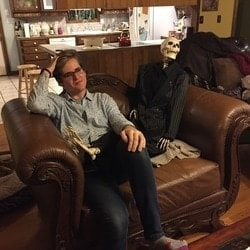 Jarad attends Middle Tennessee State University, loves tea, and tries to spend every spare second reading. Jarad is majoring in English. Bless his heart! Let's all light a candle for him and send him happy thoughts! Tennis Balls Can Talk if you take your great-grandfather’s oxidized boy scout knife and cut mouths into the felt green repetition of their bouncing and like anything that opens up you wish they didn’t after a while; I am not a busy man, but I am almost a busy man which means my time is almost valuable and that tennis balls should know and respect that fact. Seminole Record He told me the Paranoid was the band’s Seminole record and I told him not to get all Indian on me, that I thought those boys were from Birmingham, not Florida, and he gave me that look I have seen too often in my life now, as if I wanted to give razor wire a sponge bath while the pouting space ninnies were in heat, and every time he said “Sabbath” I planned to take the day off work because a man needn’t have a single religious bone in his body to know that god is as good an excuse as any to get the day off. Terrycloth Junction Wet towels were leaving the station slapping naked bottoms in all directions and I decided to write my first opera at age 93 because child prodigies are almost always a let down; they’re frontrunners but drag them into deep waters and watch them crumble… no, patience is the way to go, patience and hallucinogens in equal measure, and the mind would thank you if it had manners, I don’t know why I want to tear my brain stem out of the back of my neck and wave it around like someone’s angry flag, but I do; risking mass condemnation from all the hand towels of Terrycloth Junction… Such decisions are never taken lightly. That is why heavy people always make them and expect you to obey. Concert Hall expansive halls are expensive halls a budget to be agreed upon when no one is agreeing I tried to keep a diary I tried to keep many lovers in that diary but I proved most unworthy of the task I kept a diary for two days I gave up on love stopped pacing the streets with a personal zoology; by the time they get around to building the damn thing I shall be reincarnated as a tree frog and my fear will be foolishly palpable and your heart will be closed for the season. Shelf Life A man can be educated anywhere. What a foolish thought to have at the back of a popular movie house. The projection worker overhead hating his job just as much as the next man. And I crumple down into my seat, cover half my face to see if the movie is any better without shelf life. My knees up against my chin as though I am still in the womb and devoid of speech. And then that awkward moment of walking out of the theatre. A line forming to go inside and you want to warn them. But you keep walking. One foot after the other. And soon you build a rhythm that takes you home.  Ryan Quinn Flanagan is a Canadian-born author residing in Elliot Lake, Ontario, Canada with his wife and many bears that rifle through his garbage. His work can be found both in print and online in such places as: Evergreen Review, The New York Quarterly, Sacred Chickens, In Between Hangovers, Red Fez, and The Oklahoma Review. About the Author: B. Diehl is the author of the poetry collection Zeller’s Alley (White Gorilla Press, 2016). His work has been published by Hobart, BOAAT Press, FLAPPERHOUSE, Words Dance, and other venues. When he is not writing, you can usually find him at home, hanging out with his cats and/or feeding his social media addiction. Q. What process do you go through when writing a poem? A. I used to have a more strategic approach. I’d outline things and have a theme, and I’d try to string everything together with some clever or crazy or funny lines that would build up on my phone over time. I’d constantly write down random lines that popped into my head throughout the day, then move them over to a Word document. I still do that, but not as obsessively/compulsively. I have a more casual approach to writing now. I just sit down at my MacBook and write when I feel like writing. If whatever comes out sucks, I throw it away. If I like it, I keep it. It’s as simple as that, but it took me years to get to the point where I’m comfortable enough to do it this way. I won’t spend 3 months working on a poem anymore. If something seems unnatural and/or forced, I just move on and write something else instead. Q. Which poets inspire you or your work? A. My answer to this question changes a lot. Right now, I really like a lot of contemporary poets like Amy Saul-Zerby and Joshua Jennifer Espinoza and Noah Cicero. I’ve been reading a lot of prose, too. Lately, Chelsea Martin and Scott McClanahan have been inspiring me quite a bit. For the most part, I like non-academic stuff. I like writing by people who are weird and free and just don’t give a shit about how smart they sound. Q. Who writes better poetry? You or your cat? A. My cat. When he wraps himself around my head at night and lulls me to sleep with his purring, that’s some good-ass poetry. Q. What makes a poet successful? A. A poet is successful when they stop complaining about no one buying their books. Most people do not like to read. And most people who do like to read don’t read poetry. Being a poet is definitely not something you should do if you’re trying to get famous. But if all you wanna do is write some poems and maybe sell a few books once in a while, you can totally be a success in your own way. Otherwise, download GarageBand and write some pop songs. Or become a porn star. People are pretty into porn, I think. Q. What advice do you have for the people who want to start writing poetry? A. Read a lot. Seriously. And I don’t just mean 2-line poems you happen to stumble upon via Instagram. Spend the money you don’t have on poetry books, then sit down and read them. You probably already know of a lot of the classic poets, so check out some newer poets. A lot of people might yell at me for saying this, but right now, I think poetry is better than it has ever been. At this point, the word “poetry” has no limits at all. Most of the poems I fall in love with these days just read like somebody’s manic iPhone drafts. I think that’s awesome. Kind of punk-rock. Q. What is one of your favorite pieces from Zeller’s Alley and why? A. This is another question that has an ever-changing answer. Right now, my favorite poem in the book is either “Premonition in the Parking Lot of a Waffle House” or “Summer (Post-Breakup).” The first one is one of the first poems I ever wrote that I intentionally made “too wordy.” Critics of poetry like to call things “too wordy” and say “less is more,” so I wanted to play around with that idea. It’s something I do a lot now. Seems more natural to rant a little. The second poem is just a really short thing I wrote after my publisher said I should add some shorter pieces to the manuscript. The first time you read it, you may think it’s nothing. But the more you read it, the more you realize how many different meanings it can have. I usually aim for one particular message, but this poem is something different and something very special to me. Q. Tell us a little about Philosophical Idiot. A. Philosophical Idiot (www.philosophicalidiot.com) is an impromptu webzine I created to help out writers I like. There is no set schedule. No submission guidelines. People can submit poetry, prose, or whatever else they have via the email address: [email protected]. If I like what I see, I’ll publish it. The site is just something I do for fun. I intentionally made it look like a 5-year-old designed it –– basically just to troll super serious zines/journals. Pretentiousness is the worst. I’ve seen people refer to their WordPress blogs as “publishing houses.” It’s all so silly. No point in acting all “high and mighty” because deep down, none of us bookish people even know what the hell we’re doing. So let’s be real about it. We may be thoughtful at times and have enormous dreams, but we’re all just philosophical idiots. What’s your personal definition of poetry? What do you think qualifies as poetry? If you write something and call it poetry, then it’s poetry. I see a lot of people attacking people like Lang Leav and Rupi Kaur, saying, “What you write is not poetry!” I say it is poetry and that these people just don’t like it. I’m not a fan of Lang or Rupi either, but I think people should spend more time praising what they love instead of attacking people they don’t even know on the Internet. Q. What are the main themes that most often appear in your work? A. Heartbreak, depression, social anxiety, shitty jobs, and technology. I try to branch out, though. Q. How have your poems evolved over time? A. Hmm. They’ve just become a lot more direct. Instead of wasting like 7 hours trying to think of a perfect metaphor or simile to describe say, a flowerpot, I’ll probably just say what the flowerpot looks like. The flowerpot looks like a flowerpot. Q. What made you want to write poetry? A. My mental and emotional problems. Also, no one was down to start a screamo band with me, so I figured I’d write some poems instead. 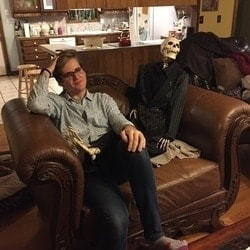 Jarad attends Middle Tennessee State University, loves tea, and tries to spend every spare second reading. Jarad is majoring in English. Bless his heart! Let's all light a candle for him and send him happy thoughts! The Sacred Chickens of Rome by Nate Creekmore tells the story of these divine birds in illustrated form.
Follow the link to follow the story! In a nutshell, the story of the sacred chickens is thus: Publius Claudius Pulcher attacked the Carthaginian fleeting the harbor of Drepanum during the First Punic war and suffered a serious naval defeat. This loss was believed to have been divine punishment for his sacrilege, going to battle against the divination of the priest and the sacred chickens on board. The fact that the chickens refused to eat was seen as a sign that the battle would not go well for the Romans. Claudius, determined to go to battle, tossed the chickens into the sea, saying "Let them drink then!" This story is often considered an odd little footnote in the history of Rome. What about its place in the history of poultry? If you're like Jarad, Morty, and myself, you've probably wondered: But what about the chickens? How did they feel? How did they fare? What high place in Poultry History do they occupy? This magnificently drawn comic will answer your questions! It is updated on Wednesday mornings. Tune in with the rest of us! Read it to your chickens! Thanks to Mr. Creekmore for remembering the real heroes of this story. The Sacred Chickens. 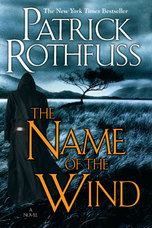 What do you do when you read? This is the question that one of my professors posed this semester. It seems simple enough, but it’s hard to answer because, in my experience at least, reading is not a conscious act. For most, it’s a process that we learned as children, but it’s not innate like language. As I was finishing this book, that question was on my mind. For me, as I would assume is the case for most people you create a mental image in your mind, immersing yourself in a completely different world. The words and phrases come to life through your imagination. This makes reading a singularly unique process. Also, for most of human history, those who were privileged enough to learn to read and write were obviously more educated than those who couldn’t. So, reading is a form of education, and education equals a form of power. Therefore, education and literature is important, because the ability to think critically is vital. Sometimes when readers get so immersed in a world with the scope and breadth of an epic, it can be difficult to pinpoint and put into words exactly what you love about it. That’s sort of what I’ve been experiencing with this book, which at seven hundred plus pages makes for a hearty feast for any lover of fantasy. It centers around the heroic and tragic tale of Kvothe, a legendary figure who is now in hiding as an innkeeper. After some goading, he begins to tell his story to a character known as Chronicler, who promises to tell his story honestly. Let me begin by talking about the writing, which is fantastic. There is never a frivolous word or phrase throughout; it all contributes to the plot. I think that is partly why it’s so compulsively readable, because everything is meticulously planned. The reading experience is like watching puzzle pieces fall together. The main character, Kvothe, while not entirely unique, is very well done. He’s the classic hero that has been seen in other trilogies, portrayed as a genius among his classmates, a prodigy. But like many brilliant minds, his Achilles heel is hubris; however, even when his plans to go awry, he manages to talk his way out of trouble. There are a few instances when I found his resourcefulness to be unrealistic, but this novel is one of High Fantasy, and in the end, there weren’t enough of these to make me dislike the character. The character and story arcs are what really make this novel great. I want to know more about every single character who appears here, because they were written so well. I don’t really feel like any of them are stereotypical background characters. The author them each a distinctive personality, and I would love to know more about all of them. I would like to refer back to the opening paragraph now. Kvothe, before he goes to the University, spends some time living in the streets in the streets of a prominent city. While there, his most valuable possession is a book that his mentor gave him when he was a child. He cherished it, and while he could have easily pawned it or used it as kindling during the winter, he didn’t for a couple of reasons. One, because he’s a lover of literature, and that would have horrified both him and me. But more importantly, the book and his teacher are what started his education. He cherishes both the connection to his mentor and the knowledge the book holds. Many people in around him do not even have the ability to read and write, so by keeping the book he reminds himself that his situation is only temporary. The Chandrian are one of the main antagonists in the book. They are mythical creatures that are not supposed to exist outside of bedtime stories. But, through a painful experience, Kvothe discovers that they are all too real. When I first read this, I thought I recognized the name or something. Then I realized that they heavily resemble the Chimes, which appear throughout the Sword of Truth series. The Chimes, like the Chandrian, are powerful and ancient elemental agents of destruction that must be destroyed. However, that is as far as the similarities go. I can truly say that I loved this book, and I’m looking forward to picking up the next installment. I loved the way this was constructed and how well written it was. What few issues I found did nothing to deter me from the plot. I would highly recommend it to anyone I know. 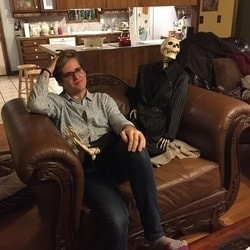 Jarad attends Middle Tennessee State University, loves tea, and tries to spend every spare second reading. Jarad is majoring in English. Bless his heart! Let's all light a candle for him and send him happy thoughts! 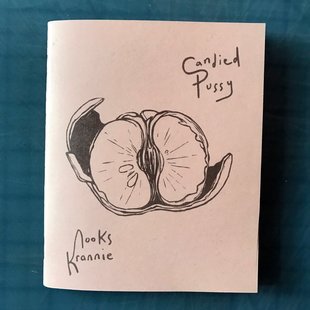 Candied Pussy by Nooks Krannie Review by Julie Carpenter In the author’s own words this “chapbook is full of poetry that deals with sexuality, comfort in your own skin and color, relationships, confusion about all of these things and trying to basically survive”. The poems are short musings with a stream of consciousness feel to them. Some of the poems are written in paragraph form with sharp, individual thoughts divided by slashes, a fitting format for the stream of thoughts and ideas that form instantly and play off each other. Some are arranged more traditionally in lines. The entire chapbook is an experience that feels like nothing so much as stepping into someone else’s mind for a few moments. We see out of the narrator’s eyes, with the history of her experiences hovering in the background, implicit in most cases, but still forming the unseen foundation of experience. There are many lines which are sharp and directly to the point. For instance, this line on page 23 in “a poem about cher”: i’m suffering from ego love/ it’s sort of like self love but more for the idea of me instead of the real me. Sometimes the reader feels the same confusion of mind that the narrator must feel. Thoughts crash against one another and become tangential, barely touching. The book is at once personal and universal. Most readers will recognize the immediacy of thought and the notion of the brain producing a stream of ideas which must be observed, sorted and ordered. The book is thoughtful and experimental. 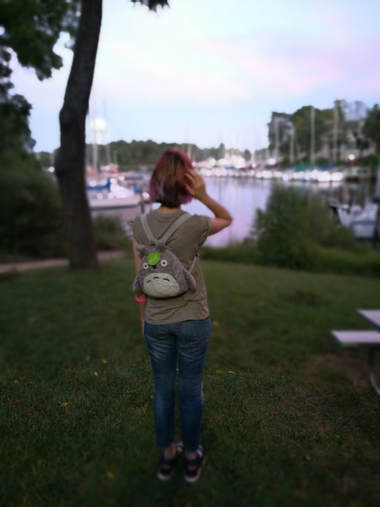 Nooks Krannie is a Palestinian/Persian female writer from Canada. Her work has appeared in Entropy, Eunoia Review, Alien Mouth, The Airgonaut, Fluland and other online and print journals. She tumbls at http://nkrannie.tumblr.com/ and instagrams @nookskrannie. |

Click Photo above to buy ebook or paperback from Amazon.
Here's the link to Barnes and Noble Or order through your favorite independent bookstore! Categories
All
|
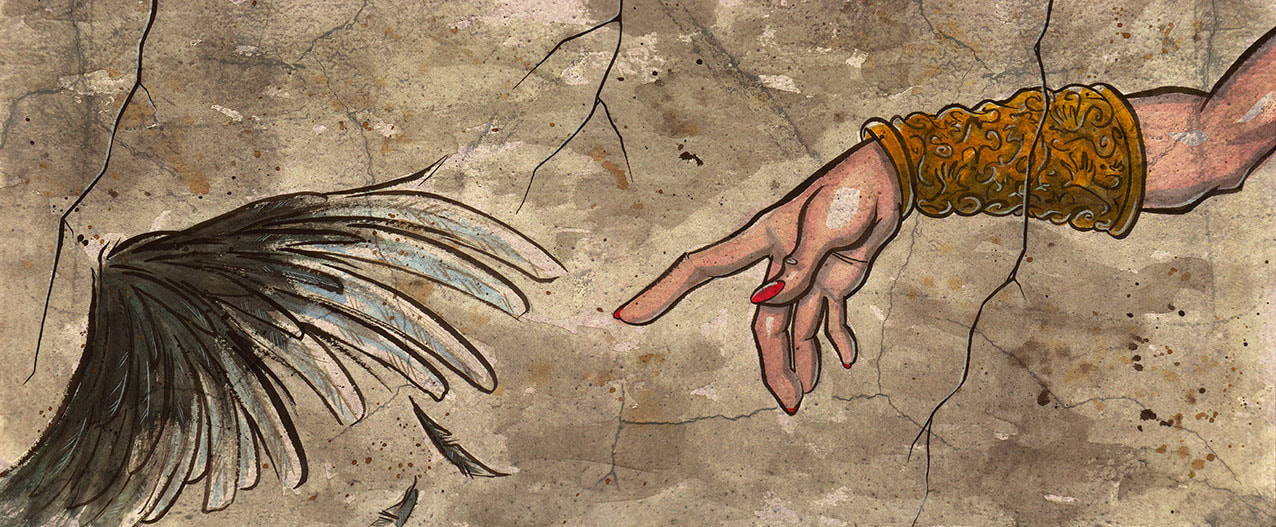
 RSS Feed
RSS Feed